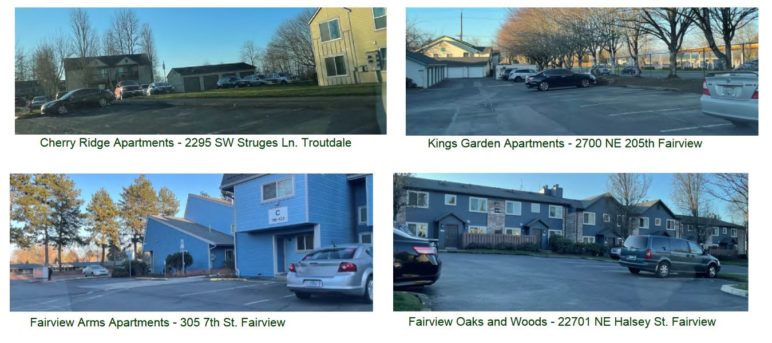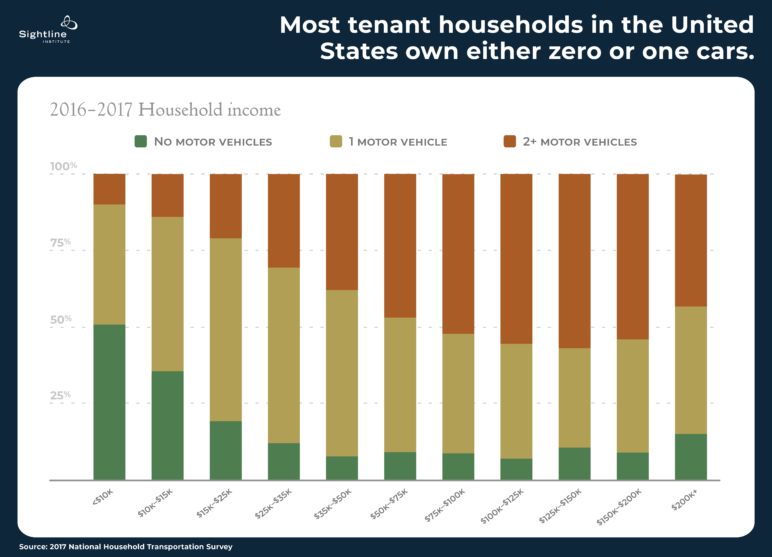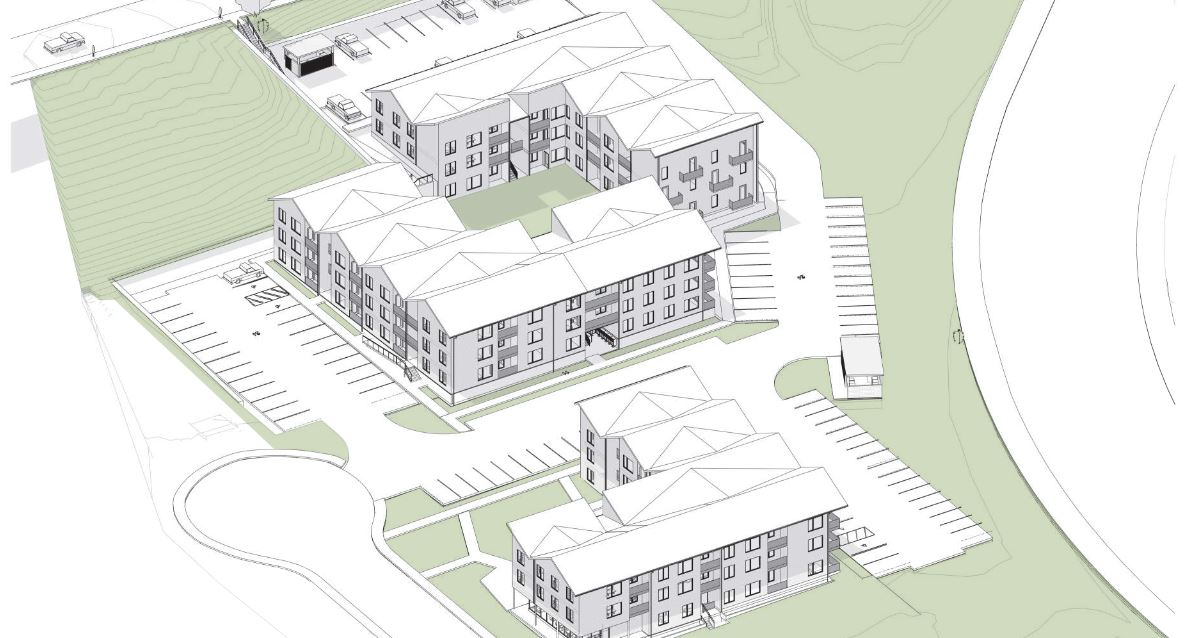Takeaways
Troutdale, a suburban city five miles east of Portland, requires each new home to come with at least 2 parking spaces.
Car counts at similar projects nearby suggest residents will probably average about 1.1 cars per home.
The affordable housing provider proposed 130 spaces: 1.4 per home. Last month, Troutdale’s planning commission rejected that.
A state rule set to take effect Jan. 1 would end parking mandates for this and other projects, but Troutdale is among 9 cities suing to block it.
For years, the City of Troutdale, Oregon, has pushed other government agencies to force the people living in tents along nearby riverbanks to move somewhere else.
Situated on the Columbia and Sandy rivers five miles east of Portland, the city of 16,400 that bills itself as the “gateway” to the spectacular Columbia Gorge has far more low-income residents than low-priced homes, according to a city-commissioned analysis. Zillow estimates that average monthly rents in Troutdale recently exceeded $2,000, a 29 percent jump in 18 months.
Last year, a Troutdale city councilor personally led what the mayor of a neighboring city called a “group of vigilantes” to illegally tear down riverside campsites using “a Bobcat and other tools.” They had organized on Facebook and were under the impression that the sites were unoccupied at the time and the objects they threw away were unused garbage.
The tensions haven’t stopped there.
This fall, as other government agencies have worked to fund and design a local project with 94 homes at a range of below-market rents, Troutdale has been saying: no, no, no.
Base monthly rents in the proposed cluster of three-story buildings would range from $559 for some studios to $1,438 for some two-bedrooms. They’d be two blocks from the city’s historic downtown core and two TriMet bus lines.
Troutdale officials insist that an affordable housing project proposed for their city include 26% fewer homes so it can make room for a bigger parking lot.

The city’s complaint: city officials say that 94 apartments is too many for 130 parking spaces. Troutdale is insisting that the project instead eliminate one of its three buildings to make room for a bigger parking lot.
The 94-home proposal from Home Forward, the county’s federally affiliated affordable housing provider, is exactly the sort of project Oregon’s state land use commission had in mind in July, when it unanimously voted to roll back parking mandates in most urban and suburban areas, especially for homes that meet affordability standards. If that rule takes effect on January 1, 2023, as scheduled, the Home Forward project would be able to move ahead with 130 spaces for 94 homes.
But if the City of Troutdale has its way, the new “Climate-Friendly and Equitable Communities” rules won’t take effect on January 1. Troutdale is one of nine cities around the state that have agreed to sue to block them.
Similar projects nearby have much more parking than they need, developer says
Troutdale officials say they’re bringing the lawsuit as a matter of principle, not because it would give them more leverage in this high-profile negotiation with what’s effectively a different branch of government.
Home Forward, meanwhile, says it’s trying to keep a commitment to taxpayers. Sixty percent of metro-area voters agreed in 2018 to fund at least 111 new affordable homes in east Multnomah County alongside thousands of others around the region.
Based on its review of the number of cars parked overnight at similar affordable housing projects in Troutdale and nearby Fairview, Home Forward estimates that the future residents of the 94-unit building it aims to construct would probably need space for about 103 cars.

But Troutdale requires parking lots in new residential buildings to have no less than two parking spaces for every home, even a studio apartment. Over the summer, Home Forward approached the city with a proposal: it would eliminate one of the two garbage and recycling areas originally planned for the site. This would bring the parking count to 130, 27 more parking spaces than it estimates its future residents will use. But it wouldn’t require eliminating any homes.
That was still 31 percent less parking than the city generally requires. On September 14, Troutdale’s planning commission rejected that compromise after hearing a series of local residents criticize the project. The concerns raised ranged from curbside parking shortages in front of nearby businesses to a worry that children living in the two-bedroom homes might, in the absence of additional playground equipment, turn to crime.
The planning commission agreed not to make any exceptions for the affordable housing proposal. They also overruled city staff by rejecting various other negotiated compromises, including allowing an unused city cul-de-sac to become part of the property in order to fit more parking spaces on site.
Home Forward subsequently asked its architecture firm to figure out how many homes would need to be cut to follow Troutdale’s parking mandates. The answer: 24 homes, more than a quarter of the project.
Excessive parking mandates frequently block low-cost homes
As Sightline wrote in July, project after project in Oregon has hit the same barrier over the years: city codes that forbid the construction of homes without also constructing more parking spaces than the residents are likely to actually use.
These bans on low-parking homes were typically written years before and applied citywide regardless of local circumstances. In most cases, they apply even to homes specifically targeted at low-income Oregonians, who—beyond being in deeper need of affordable housing—are statistically less likely to own as many cars.

Last summer, 41 housing, business, transportation, and environmental groups from around the state expressed support of Oregon’s parking reforms. Home Forward was one of 12 affordable housing providers to join.
Anyeley Hallova, then the vice chair of the state’s land use and development commission and a developer of affordable housing projects herself, said in May that by removing parking mandates, the rules would remove barriers to fitting more affordable homes in more walkable areas.
“In the past, a lot of our more affordable housing has been concentrated in certain areas of cities, or in certain cities and not in other cities,” she said.
Opposing the rules were a variety of local governments. Some, though not all, cited the parking reforms.
“Since I’ve been on council for 10 years now, I can sum up in three words some of the most important issues: parking, parking, parking,” Eugene Councilor Claire Syrett told the commission in May. “It is a huge topic that you don’t expect when you join city council.”
Voters in Syrett’s district removed her from office last month in a low-turnout recall election motivated, in part, by a group of Eugene homeowners who support banning the construction of new homes without off-street parking.
Since the state rules’ passage on July 21, at least nine cities have voted to join a lawsuit to block them. The cities are expected to claim that the state land use commission exceeded its legislative authority.
State law orders the commission to set rules that will, among other things, “avoid principal reliance upon any one mode of transportation” and “minimize adverse social, economic and environmental impacts and costs.”
Lawsuit is about ‘Extreme timelines,’ city official says, not blocking housing

Troutdale’s mayor and city manager referred requests for comment to David Berniker, the community development director. Berniker, who has been on the job for three weeks, said in an interview Friday that he believes Troutdale would be suing to block the state rules regardless of its simultaneous dispute over the Home Forward project. “I think the folks that are responding to CFEC are responding to policies and extreme timelines that are coming down from the state,” Berniker said.
He said that though it’s not technically complicated remove parking mandates from city code, the city wouldn’t want to make that change without months of expensive outreach to Troutdale residents.
Berniker, who has a background in architecture and planning, added that though it would be technically possible to fit 94 homes on the site, he couldn’t say whether the city might eventually agree to a deal that allows that many to exist.
“Personally, my hope is that we’ll reach a middle ground on the parking and on design elements,” Berniker said. “I think there’s support for the project. It’s not universal, but there is definitely support for this project in terms of completing a complete, connected, cohesive community.”
Another interested party is Multnomah County Commissioner Lori Stegmann, who represents the Troutdale area and signed off on the deal for the county to donate 3.5 acres of land, worth more than $1 million, to the Metro-funded project.
“Commissioner Stegmann was extremely disappointed to hear about the position of the planning commission,” her chief of staff, Rebecca Stavenjord, said in an interview. “Providing additional affordable housing options in Multnomah County, especially east Multnomah County, is an incredibly high priority for the commissioner.”
Sightline researcher Catie Gould contributed to this report.
Correction 11:41 a.m.: A previous version of this article gave an incorrect deadline for cities to appeal the state parking rules. Oregon sets no deadline for a substantive appeal.



Comments are closed.